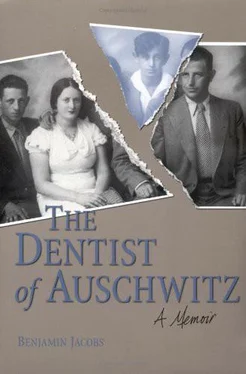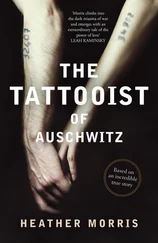Each morning all Jewish men, and sometimes women, had to report for arduous and demeaning chores. I’ll never forget the strain of kneeling on the side of the road and breaking down large stones with a heavy hammer for road construction.
In the meantime the Nazis rolled through Europe with unparalleled ease. To the west they were in France, Belgium, and the Netherlands. In the north they were in Norway. To the southeast, Italy, Yugoslavia, Greece, Romania, Hungary, and Bulgaria were under their control. In North Africa, General Rommel was near El Alamein. The Nazis seemed to extend their influence to the entire world. It seemed unlikely that Great Britain and the Soviet Union were a match for Hitler’s armies. In their speeches, Hitler, Himmler, and Goebbels used harsher, more venomous anti-Jewish rhetoric. For the Germans to fail was unthinkable.
Deprived of hope and broken in spirit, we waited for a miracle that we never really expected. Our biggest dilemma was that our people would not believe what was about to happen. We defied conventional wisdom. At each new Nazi anti-Jewish action, people commonly thought, That’s as far as they’ll go! What else can they do to us? But we were living in a world that didn’t make sense, and what we thought to be inconceivable happened. Escape from a Warthegau ghetto held extraordinary risks. Even if we were successful, where would we go? We had to accept whatever our fate had in store for us.
Suddenly the tires screeched, and the truck swerved to avoid a cow crossing the road. I opened my eyes. I was on the truck, and my father was staring at me, reading my expression.
A while later the truck pulled off the road and stopped on a grassy embankment. The guard yelled, “Get off, everyone, and relieve yourselves in the woods, but be back in five minutes.” The guards now formed a cordon around us. “If one of you escapes, all of you will pay for it.” We knew it wasn’t an idle threat.
There was a dense forest on the side where the trucks had stopped and a green meadow with red poppies across the road. When I went into the forest, the trees were so dense that they repelled nearly all light. Pervasive in the near dark was the scent of spruce. Twigs snapped under my feet. After relieving myself, I returned to the truck. I found Dr. Neumann’s eyes fixed on me.
“You there, come here,” he snapped at me. I wondered why, of all of us, he would call me, so I didn’t respond. But when I once more heard his command, I turned. “I am calling you,” he said.
Though I knew that being singled out by a Nazi often meant nothing good, I had no choice but to go. I rushed over to him and stopped at a distance of two meters, as Nazi protocol required. Don’t show him you’re afraid, I thought. “Jawohl,” I said loud and clear. He asked my name and age. When I answered, he asked me what I did before the war. “I was in dental training,” I answered him obligingly.
“Report to me when we get to camp,” he ordered.
I managed to reply a second time, “Jawohl,” and returned to the truck. My father had heard it all and saw that I was worried. Papa, always the optimist, urged me to forget all about it. “By the time we get there, he’ll have forgotten about you,” Papa said.
We drove past a pious woman kneeling in front of a Black Madonna icon, with her kerchief pulled over her face. These statues were quite common along Polish roads. A while later we came to Turek, the county seat. More trucks like ours waited in the square. They carried Jews from Kodawa, Kutno, Golina, and Turek itself. Thirty minutes later the whole convoy pulled out in an northerly direction. “This means that we are going to Poznan,” Papa said. He had traveled here often, and he knew the roads well.
Outside Turek the road widened, and the trucks began to clatter along at a faster pace. The sun arched overhead, bathing the fields and the people who toiled in them in warmth. Most of the peasants stood up and stared at the convoy of strangers being herded past. The two Waffen SS guards on our truck stood stone-faced and rarely spoke. After a three-hour journey, we turned onto a gravel road. The bouncing of the truck made resting against the sideboard uncomfortable. Big clouds of dust, loosened by the tires, enveloped our clothes and faces. Gravel banged against the fenders constantly.
As the sun made its slow descent, the vehicles approached what seemed to be a typical two-story schoolhouse. Near it were three wooden barracks. All this was surrounded by a three-meter wire mesh fence topped with barbed wire strung on cane-shaped posts. Except for these structures, there was nothing but fields. This must be our new home, I thought.
The lead vehicle stopped at the entrance. Several SS men with German shepherds at their sides stood, awaiting us. Dr. Neumann handed one a list of our names. They spoke briefly, and one SS man grabbed a bullhorn. “You have been brought to Steineck labor camp, where you’ll learn how to work.” Then he lowered his bullhorn and scanned our faces on the trucks, as if to say, “Are there any questions to be asked?” If there were any, who would have dared? He moved and paused at every truck, repeating his decree, making sure no one missed it.
Then our guards lowered the tailgates and pushed the human cargo down with their rifle butts. “Down quickly, all down,” they shouted.
We grabbed our bags and jumped off the trucks in panic. Two SS men at the gate funneled us inside like ranch cattle being readied for branding. Chaos erupted as the first group of men reached the gate. Two SS men standing on either side whipped us at random as we passed them. Given leash, the dogs picked up the cue and lurched at our arms and legs. Those of us who staggered were their special targets. I saw what was going on and froze. If Papa and I were to avoid being battered, I thought, we’d have to slip by as the men lifted their whips. With my suitcases in one hand and my box of instruments dangling from my shoulder, I held on to my father. I hung back and waited just long enough. When the whips rose, we dove past like sprinters. I escaped injury, but my father was not so lucky. He ended up with a laceration on his scalp.
Once inside the camp, we ran up some stairs, through a pair of swinging doors, and down the corridor of the schoolhouse. On the right were windows overlooking the yard; the rooms were on the left. “All to Room 4,” yelled Chaim, the policeman who came with us.
On three walls of the room were rows of bunks, mere shelves stacked atop each other. On them lay straw pallets with gray blankets and pillows. Most bunks were already occupied. The greeting we received had fueled fear. Chaos prevailed, as most of us were unable to find bunks. Finally Papa and I spotted two empty bunks on the lowest level. Little did we know they were the least desirable. The bunks were so tightly spaced that we had to kneel on the floor and slide in. Our baggage we piled up against the wall by the window. With my box of instruments under my pillow, I felt as if I had arrived not just at a labor camp, but in another world. I knew that here I had to learn life all over again.
More people came. They milled back and forth between rooms, unable to find a place. Amid the tumult, someone yelled, “Attention!” The SS man who had so succinctly instructed us at the gate entered Room 4, followed by Chaim.
“Here all of you will work. You must salute when you see people in uniform. When spoken to, you must stand at attention, chest out, head up, shoulders back, hands at your trouser seams. The first of you who sees one of us enter the room must call everyone to attention. All inmates must be in their bunks by eight. The light must be out a half hour later. Wake-up is at 4:00 A.M. You’ll get an hour to be ready for work. Saturday and Sunday are free. Tomorrow your clothes will be deloused, your hair shorn. You’ll get your work assignments on Monday!” He turned to leave. Then he stopped, as if he had forgotten the most important announcement: “Anyone contemplating an escape, better not try!” Then he turned and walked out, followed by the policeman. He left us frightened and pondering the consequences of any disobedience.
Читать дальше












